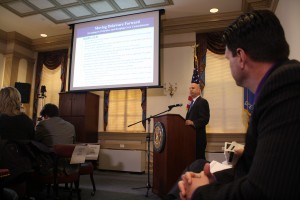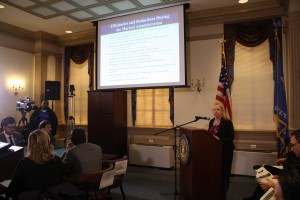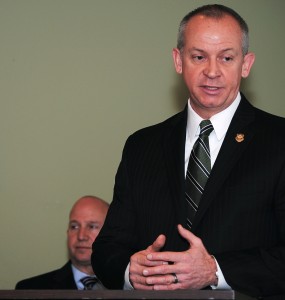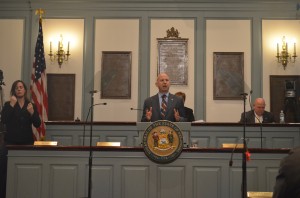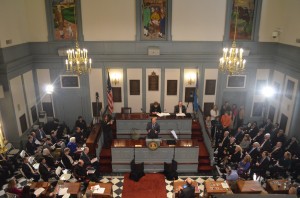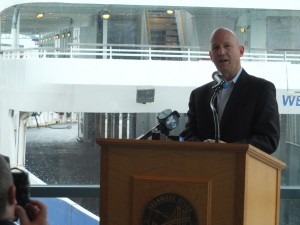Governor signs HJR 2, creating the Wilmington Public Safety Strategies Commission; first meeting set for February 10, 2015
Wilmington, DE – Governor Jack Markell today announced the membership and the preliminary meeting schedule of the Wilmington Public Safety Strategies Commission. The Governor also announced that the Department of Safety and Homeland Security has hired two leading public safety consultants to assist the work of the Commission.
Announced during the Governor’s State of the State address, the group is tasked with carrying out a rapid, fact-based, intensive examination of public safety strategies in the City and offering recommendations to address Wilmington’s significant problem with violent crime.
The Commission was established by House Joint Resolution No. 2, which was sponsored by the entire Wilmington delegation of the General Assembly and co-sponsored by all other members of the legislature. HJR 2 passed the House and Senate last week and was signed by the Governor on January 29, 2015.
Lew Schiliro, Secretary of the Department of Safety and Homeland Security, and Joseph Bryant, Jr., Director of Public Safety for New Castle County, will lead the Commission. Other members of the Commission are:
- Chief Bobby Cummings of the Wilmington Police Department, appointed by Mayor Dennis P. Williams;
- State Prosecutor Kathy Jennings of the Attorney General’s Office, appointed by Attorney General Matt Denn;
- Governor Markell’s Deputy Chief of Staff Drew Fennell, representing the Office of the Governor;
- City resident Cassandra Marshall, representing the Wilmington community and currently President of the Quaker Hill Neighborhood Association;
- City resident Darryl Chambers, representing the Wilmington community, and currently a researcher at the University of Delaware’s Center for Drugs and Health Studies;
- Rick Gessner, Vice President and Delaware Market Liaison at Capital One, representing the Wilmington business community; and
- James Wright, a retired officer of the Wilmington Police Department.
The Department of Safety and Homeland Security has retained the Police Foundation of Washington, D.C. and Vigilant Resources International of New York to serve as consultants and assist the Commission in its work.
The Police Foundation is a non-profit foundation dedicated to helping police be more effective by working closely with police officers and agencies across the country and providing research and evaluation of police strategies. The Police Foundation’s work will be led by Jim Burch (Vice President; former Assistant Director of the ATF and Deputy Assistant Attorney General), Jim Bueerman (President; former Police Chief, Redlands, CA) and Blake Norton (Vice President; formerly of the Boston Police Department).
Vigilant Resources International assists clients with public safety analysis, strategy and capability development by drawing on years of executive, command, operational and technical experience with fighting crime. Vigilant’s work will be led by Howard Safir (CEO; former Police Commissioner of New York City); James McMahon (former Superintendent of the New York State Police; former Deputy Executive Director of the International Association of Chiefs of Police); and Sylvester Daughtry (former Executive Director of the Commission on Accreditation for Law Enforcement Agencies; former President of the International Association of Chiefs of Police (IACP); former Chief of Police of Greensboro, NC).
“New economic development investments, the growth of major employers, and the city’s many cultural assets are all contributing to make Wilmington a fantastic place to live and work,” said Governor Markell. “But for too long, the City has had a significant problem with violent crime. Other cities have reduced their crime rates, and Wilmington can too.
“We must do more to ensure we take the most effective approach to fighting crime. I very much appreciate the commitment of all the members of the Commission and the leadership of Lew Schiliro and Joe Bryant to fulfill that mission.”
“This Commission will undertake an intensive review of public safety strategies in the City,” said Secretary Lew Schiliro, Co-Chair of the Commission. “This is not easy, but we have a very capable commission and leading national experts helping us with this work. The Governor has made clear that crime in the City of Wilmington is a problem for everyone in Delaware, and I know all of us are committed to solutions.”
“I have been involved in policing for 39 years, and I know that with solid policing and community support, we can turn around neighborhoods and reshape lives,” said Director Joe Bryant. “This Commission can be a part of the solution and I look forward to listening to the community, to police officers, and to businesses on how we can improve public safety in the City.”
Meeting Schedule
The first meeting of the Commission will be held on Tuesday, February 10, at 5:30 p.m. at the Walnut Street YMCA, 1000 Walnut Street, Wilmington. Future meetings of the Commission will be finalized at that meeting, but are expected to take place on the following dates:
February 17 @ 5:30 p.m., location to be determined
March 10 @ 5:30 p.m., location to be determined
March 17 @ 5:30 p.m., location to be determined
March 31 @ 5:30 p.m., location to be determined
The Commission will receive public comment at all of its meetings, with public comment focusing on particular subjects based on the content of each meeting. People interested in providing public comment should watch the state’s public meeting calendar and other notices for designations of the subject and any updates to the dates and times of particular meetings.
###
